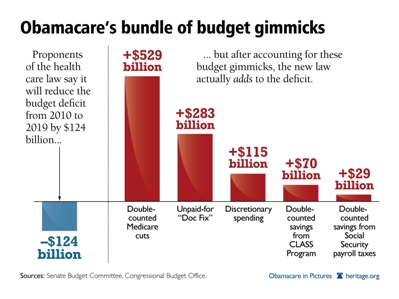Perhaps most important, the legislation creates an Independent Payment Advisory Board, a panel of independent medical experts who will look for more ways to improve Medicare’s cost-effectiveness. Under the law, any policy that the board issues takes effect unless legislation to block it is passed by Congress and signed by the president. This way, inertia works in favor of cost containment rather than against it.
The intent of Orszag's piece is to advance the thoroughly unconvincing claim that Obamacare reduces overall healthcare costs. In fact, the federal government's own actuary has refuted this argument, and the Heritage Foundation exposes the gimmickry upon which Orszag's case relies:

His false thesis aside, Orszag's gleeful admission about "cost containment" is stunning, and it reinforces several conclusions about which conservatives
Recommended
• By January 15 each year, the Independent Payment Advisory Board must submit a proposal to Congress and the president for reaching Medicare savings targets in the coming year. The majority leaders in the House and Senate must introduce bills incorporating the board’s proposal the day they receive it.
• Congress cannot “consider any bill, resolution, amendment, or conference report … that would repeal or otherwise change the recommendations of the board” if such changes fail to meet the board’s budgetary target.
• By April 1, the committees of jurisdiction must complete their consideration of the proposal. Any committee that fails to meet the deadline is barred from further considering the bill.
• The secretary of health and human services must implement the Independent Payment Advisory Board’s proposal, as passed by Congress and signed by the president, on August 15 of the year in which the proposal is submitted.
• If Congress does not pass the proposal or a substitute plan meeting the Independent Payment Advisory Board’s financial target before August 15, or if the president vetoes the proposal passed by Congress, the original Independent Payment Advisory Board recommendations automatically take effect.
Considering Democrats' control of the US Senate and the current occupant of the Oval Office, these requirements make it virtually impossible for Congress to overrule the panel's recommendations. Orszag described the new process with even greater candor during an April appearance at the Economic Club of Washington, DC:
Here, Orszag marvels at the IPAB's "enormous" degree of power to identify and achieve "aggressive" cost-cutting targets. He chuckles about how little power Congress retains in the matter, reminding the audience that Congressional Democrats were fully aware that they were ceding this authority to federal bureaucrats when they passed the legislation. (Incidentally, this also lays bare the utter hypocrisy of Harry Reid's recent opposition to an earmarks ban, which he says is based upon the principle of protecting Congressional power vis-a-vis the executive branch. Reid on 11/16/10: "[The earmarks moratorium] just gives more power to the executive. I'm not one who believes in that.")
Part of the administration's disingenuous case for Obamacare included the ludicrous promise that in order to create a new entitlement program, the goverment would slash half a trillion dollars of waste and inefficiencies from an existing one (Medicare). As the graph above indicates, these supposed savings were also "double-counted" by White House budget wizards, who impossibly stated that $500 Billion in found money would help fund Obamacare while simultaneously "
Even so, the Left now concedes that the process of slicing Medicare's budget by such an astronomical sum will require tough choices, now described by Orszag as an "aggressive" program of cuts. This process is more commonly known as government rationing -- a deeply unpopular prospect whose inclusion in Obamacare the White House vehemently denied. To further illustrate this point, simply recall the Left's hue and cry over Sarah Palin's "death panels" facebook post. They objected so strenuously to concerns over government rationing because they knew them to be valid.
Ironically, President Obama all but admitted that rationing would be an inevitable cost-reducing element within his plan when he famously told Jane Strum that her elderly, but vivacious, mother would likely be denied a pacemaker due to her age. Evaluating someone's "spirit" or "joy for living" was too "subjective" a standard, Obama intoned on ABC News, suggesting that the 105 year old woman in question might be better served by ingesting painkillers.
Orszag's Economic Club remarks and his Times Op/Ed confirm Smith's account of America's new rationing reality. The IPAB will determine what forms of care will be rationed, and it will require an outright majority in the House, a super-majority in the Senate,

























Join the conversation as a VIP Member